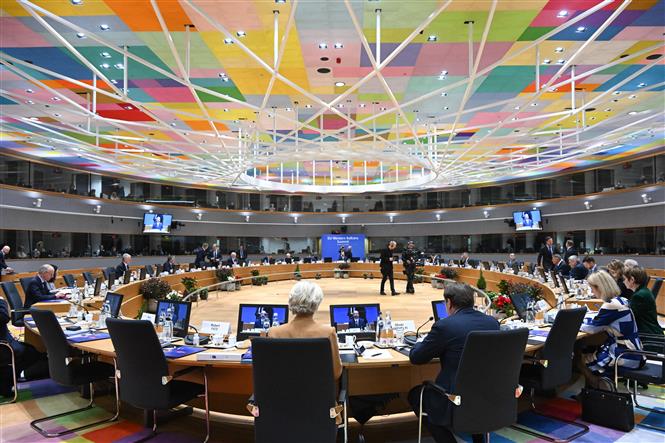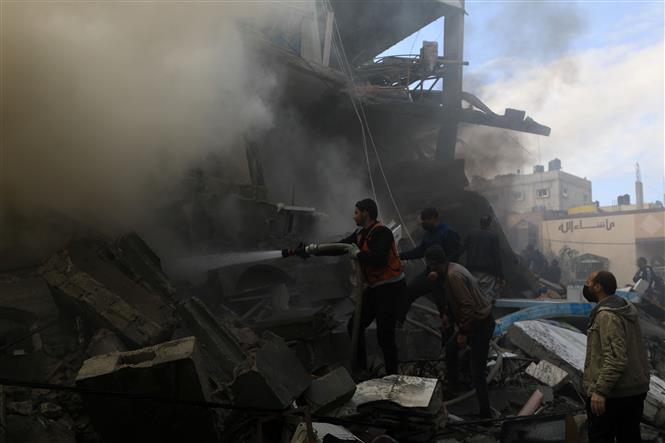The EU’s Dilemma: Caught Between Two Battles

Image: AA/TTXVN
According to Jade Wong, a senior researcher at the Gordon & Leon Institute in the US, the EU is currently caught between two conflicts in Ukraine and the Middle East. Both are taking place right at the “gateway” of Europe and are heavily impacting the region’s economy and society. These battles are also severely undermining the security and order of Europe.
Last year, Josep Borrell, the head of the EU diplomatic agency, described his feelings upon hearing about the Israel-Hamas conflict as similar to the day the Russia-Ukraine conflict erupted. He stated, “We are facing another decisive moment in history, causing immense suffering for people and determining the global role of the EU for years to come.”
Although the EU has managed to avoid the worst-case scenario, it has failed to turn the crisis into an opportunity. However, the continent has adapted to the circumstances and found ways to protect its values and interests. In fact, one could argue that the current situation has somewhat helped the EU avoid more significant difficulties.
As the conflict in Ukraine intensifies, Russian President Vladimir Putin has put Russian forces on high alert, raising the specter of a nuclear war in Europe. Avoiding escalation or further spread of the conflict is the EU’s most urgent need. Furthermore, the EU does not want to see the entire Asia-Europe region plunged into chaos, a stance evident in cautious statements regarding the military activities of the Wagner Group.
Additionally, the EU is not seeking a quick or complete victory for Ukraine. Two major offensives launched by Ukraine in the fall of 2022 and again last summer have resulted in a prolonged stalemate on the battlefield. However, at the recent Munich Security Conference, German Chancellor Olaf Scholz rejected providing Ukraine with Taurus cruise missiles, partly due to concerns that they could be used to attack deep into Russian territory.
Apart from strategic considerations, two factors have prevented the EU from deeper involvement in the conflict: the decision-making mechanism at the EU level and the national positions. The EU’s military production capability is another limiting factor.

Image: THX/TTXVN
Regarding the Middle East issue, the EU is in a more difficult position. The Israeli-Palestinian conflict has divided Europe. Despite being the largest aid provider to the Middle East, the EU has not been able to demonstrate its political significance after the outbreak of the conflict in Gaza. The military power of the United States, with two aircraft carrier strike groups and the Prosperity Guardian campaign, is stabilizing the situation in the region.
Europe has many concerns related to the Middle East. Firstly, they want to avoid refugee waves. The Arab Spring in 2011 led to the European refugee crisis in 2015, and it still haunts the EU. With limited military resources, the EU does not want to face multiple wars simultaneously in the Middle East, Ukraine, and potentially the Indian Ocean-Pacific region. Meanwhile, the EU aims to ensure maritime shipping routes and freedom of trade.
Believing that the actions of the United States have addressed Europe’s main concerns, the majority of the EU has accepted and cooperated. The EU has also deployed its own independent escort campaign in the Red Sea, Operation Aspides, although it is intended to complement US activities.
Successes in the past sometimes become burdens in the present, as is often the case. The current difficulties faced by the EU are the result of the complex legacy of past successes.
Integration, starting from the beginning of the Cold War and accelerating after its end, has been the winning formula for Europe for half a century. It not only established the order of Europe but also became the source of the EU’s strength in international affairs. However, the ongoing conflicts are challenging integration.
However, it is essential to note that European integration is not being denied. Without the hope of joining the EU, Ukraine may not have the spiritual motivation to engage in conflict with Russia. Without the prospect of EU membership, post-conflict reconstruction in Ukraine would become a significant issue, as shown by the failures in Iraq and Afghanistan.
Another important strategic issue for the EU is transatlantic relations. Europe’s focus on peace and prosperity after World War II has been placed under the “security umbrella” provided by the United States. The price Europe has to pay is accepting the hegemony of the United States. The possible return of former US President Donald Trump to the White House is causing concern in the EU.
Clearly, the EU does not have the strength to replace US hegemony, nor does it see any other potential emerging power as a potential new hegemon. Therefore, the only thing the EU can do is to accelerate its “strategic autonomy,” mainly as a supplement – and sometimes as a buffer zone – to US hegemony.
To read more finance and economic articles, visit Business Today.
